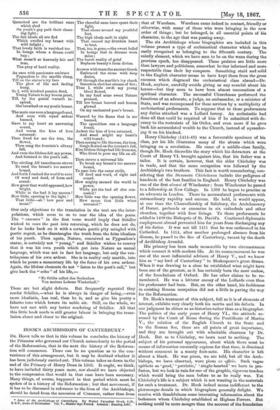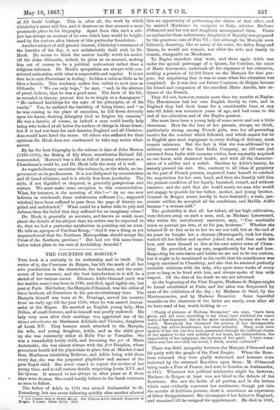HOOK'S ARCHBISHOPS OF CANTERBURY.*
DR. Hoorc tells us that in this volume he concludes the history of the Primates who governed our Church antecedently to the period of the Reformation, that in the next the history of the Reforma- tion will commence. There can be no question as to the con- venience of this arrangement, but it may be doubted whether it has been judiciously carried out. This volume takes us down to the end of the Primacy of Henry Dean in 1503. It ought, we think, to have included thirty years more, nor should we have objected to the compression that would in that case have been necessary. Many things, of course, happened in that period which must be spoken of in a history of the Reformation ; but that movement, if it has to be discussed in reference to the lives of the Archbishops, should be dated from the accession of Cranmer, rather than from • Lives of the Archbiehcpa of Canterbury. By Walter Farquhar Hook, D.D., FALB , Beau of Chichester. Yet. V., Middle-Age Period. London: Bentley,1867.
that of Wareham. Wareham came indeed in contact, friendly or otherwise, with many of those who were bringing in the new order of things ; but he belonged, in all essential points of his character, to the age that was passing away.
The six Archbishops whose biographies are included in this volume present a type of ecclesiastical character which may be easily recognized as belonging to the fifteenth century. The saintly element, which we have seen to be on the wane during the previous epoch, has disappeared. These prelates are little more than lawyers and politicians, somewhat better informed and more respectable than their lay compeers. Something staid and solid in the English character seems to have kept them from the gross excesses which disgraced the ecclesiastical class abroad—Dr. Hook, anyhow, carefully avoids giving us any scandal about his heroes—but they seem to have been almost unconscious of a spiritual character. The successful Churchman performed the functions of an advocate, a judge, an ambassador, or a minister of State, and was recompensed for these services by a multiplicity of ecclesiastical preferments. To suppose that to these preferments any duties attached was a Lollard heresy. An ecclesiastic had done all that could be required of him if he submitted with de- cency to the restraints of his Order, and even more if he gave back his accumulated wealth to the Church, instead of squander- ing it on his kindred.
Henry Chicheley (1414-43) was a favourable specimen of his class, yet his life illustrates many of the abuses which were bringing on a revolution. He came of a middle-class family, though Dr. Hook discredits the story which his detractors at the Court of Henry VI. brought against him, that his father was a tailor. It is certain, however, that the elder Chicheley was in trade, and that the same occupation was followed by the Archbishop's two brothers. This fact is worth remembering, con- sidering that the Stemmata Chicheleana include the pedigrees of hundreds of the best families in England. Henry Chicheley was one of the first alumni of Winchester ; from Winchester he passed to a fellowship at New College. In 1392 he began to practise as an advocate in London. There he accumulated preferments with extraordinary rapidity and success. He held, it would appear, at one time the Chancellorship of Salisbury, the Archdeaconry of Dorset, prebends or canonries in six cathedrals and other churches, together with four livings. To these preferments he added in 1408 the Bishopric of St. David's. Continued diplomatic employment abroad prevented him for years from discharging any of his duties. It was not till 1411. that he was enthroned in his Cathedral. In 1414, after another prolonged absence from his diocese, he passed to the See of Canterbury, vacant by the death of Archbishop Arundel.
His primacy has been made memorable by two circumstances which connect it with modern life. At its commencement he was one of the most influential advisers of Henry V., and we know him as "my lord of Canterbury" in Shakespeare's great drama. When it was drawing to a close he established what might have been one of the greatest, as it has certainly been the most useless, of the foundations of Oxford. He has other claims to be re- membered. He was a bitterer enemy of the Lollards even than his predecessor had been. But, on the other hand, his feebleness in resisting Roman usurpation did not a little in paving the way for the Reformation.
Dr. Hook's treatment of this subject, full as it is of elements of interest, exhibits very clearly both his merits and his defects. In our judgment he shines as an historian rather than as a biographer. The politics of the early years of Henry VI., the attitude as- sumed by the Court of Rome during the Pontificate of Martin V., the relation of the English Church to the State and to the Roman See, these are all points of great importance, and they are brought out with admirable clearness by Dr. Hook. But as to Chicheley, we learn next to nothing. The subject of his personal appearance, about which there must be means of information unusually copious for that time, is dismissed without comment in a scanty foot-note. His character is left almost a blank. He was pious, we are told, but all the Arch- bishops, we have observed, were pious ex officio. Such vague epithets as good," patriotic," single-hearted' we have in pro- fusion, but we look in vain for one of the graphic, vigorous touches which would bring the man before us as he really was. Yet Chicheley's life is a subject which is not wanting in the materials for such a treatment. Dr. Hook indeed seems indifferent to the picturesque details in which biographers generally delight. We receive with thankfulness some interesting information about the bedesmen whom Chicheley established at Higham Ferrers. But nothing could be more meagre than the account of the foundation • of All Souls' College. This is, after all, the work by which Chicheley's name will live, and it deserves on that account a more prominent place in his biography. Apart from this, such a sub- ject has always an interest of its own which here would be height- ened-by the curious after history of this particular foundation.
Another subject of still greater interest, Chicheley's treatment of the heretics of his day, is not satisfactorily dealt with by Dr. Hook. He seems to think the matter hardly worth his notice. Of Sir John Oldcastle, indeed, he gives us an account, making him out of course to be a political malcontent rather than a religiow3 reformer. Dr. Hook's sympathies are always with con- stituted authorities, with what is respectable and regular. It is not that he is anti-Protestant in feeling : he likes a saint as little as he likes a heretic: This tendency makes him unfair to such men as Oldcastle. " We can only hope," he says, " and, in the absence of proof, believe, that he was a good man. The facts of his life, as revealed in history, present him to us simply as a demagogue." "-He-endured hardships for the sake of his principles, or of his vanity." Yes, he endured the hardship of being burnt, and " as he was coming to the place of execution, he fell down devoutly upon his knees, desiring Almighty God to forgive his enemies." He was a fanatic, of course, as indeed a man could hardly help being who looked at all below,the surface of things in those times ; but if it had not been for such fanatics England and all Christen- dom would have fared the worse. Of others who suffered for their opinions Dr. Hook does not condescend to take any notice what- soever.
By far the best biography in the volume is that of John Morton (1486-1500), the Bishop of Ely whose strawberries Richard III. commended. Morton's was a life as full of stormy adventure as a Churchman's could be, and Dr. Hook tells the story of it well.
As regards literary execution this volume is, on the whole, an irn. provement on its predecessors. It is not disfigured by eccentricities and ill timed allusions, and it is wholly free from jocularity. The style, if not dignified or eloquent, is generally perspicuous and correct. We must make some exception to this commendation. What, for instance, is the meaning of this?—" As no one now believes in witchcraft, these unfortunate sufferers [i.e., supposed witches] have been suffered to pass from the page of history un- pitied and undefended." What could be a better title to pity and defence than the belief that they suffered for an imaginary crime ?
Dr. Hook is generally so accurate, and knows so much more about the details of his subject than his critics can be expected to do, that we feel a particular satisfaction in pointing out an error. He tells us, apropos of Cardinal Kemp, " that it was a thing as yet unprecedented that the Northern Metropolitan. should accept the Cross of the Southern province." But had not this same trans- lation taken place in the case of Archbishop Arundel ?































 Previous page
Previous page